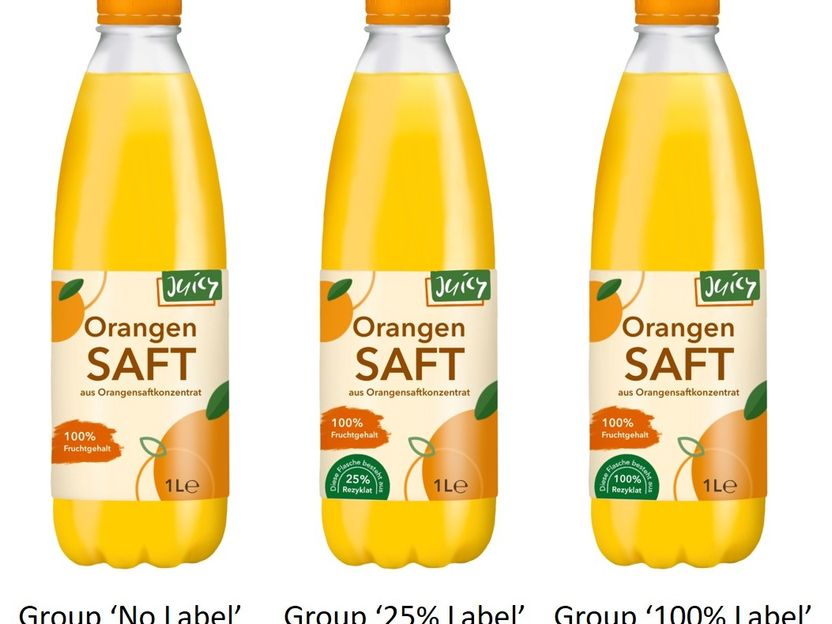How recycled packaging influences the view of product quality
Advertisement
How do consumers perceive the quality of products that have recycled material in their packaging? Madita Finke, Institute of Food and Resource Economics (IRL) at the University of Bonn, Janine Macht and Prof. Dr. Monika Hartmann, IRL and members of the Transdisciplinary Research Area (TRA) "Sustainable Futures" at the University of Bonn, investigated this using the example of orange juice. They have published their findings in the scientific journal "Food Quality and Preference".
recycling is a decisive lever for moving from a throwaway economy to a genuine circular economy, conserving resources and protecting the climate. For this reason, disposable PET bottles in EU member states must contain at least 25% recyclate - i.e. recycled material - from 2025. This legally stipulated proportion is to increase to at least 30% by 2030. Companies can voluntarily label the recycled content on their products. However, it is unclear how consumers perceive the quality of products with recycled content in their packaging. A study was therefore conducted to investigate how consumers rate the quality of orange juice in PET bottles with a 25 percent or 100 percent recycled content label compared to bottles without a recycled content label.
The research group conducted an online survey with 1080 German consumers. The participants were randomly assigned to one of three groups. Each group saw a picture of a fictitious orange juice in a PET bottle: either without a label, with a 25 percent recycled content label or with a 100 percent recycled content label. As part of a mediation analysis, the researchers investigated whether the recyclate label influences how the test subjects assess the quality of orange juice - by shaping the test subjects' expectations regarding sustainability, taste and safety. With the help of a moderation analysis, we also examined whether consumers' environmental awareness influences the extent to which the recyclate label influences the expected sustainability of the product.
A recyclate label on PET bottles for orange juice triggered a so-called "halo effect": It increases the expected product quality - primarily through increased expected sustainability. The higher the environmental awareness of the test subjects, the stronger this effect. In addition to the expected sustainability, expectations with regard to taste and safety also make a positive contribution to the extent to which a recyclate label improves the expected product quality of the orange juice.
There are only a few scientific publications on recyclate labels to date. In the absence of an established theoretical basis, we therefore drew on findings from related areas of research, such as other environmental labels.
If a product is labeled with a sustainability label, this positively perceived information is often transferred to other quality features - an effect that has already been demonstrated in various product and packaging contexts. The finding that labeling a positively perceived attribute - such as the recycled content - is particularly effective if it goes "beyond the minimum standard" could also be transferable to other product categories.
The influence of the recycled label on taste perception is likely to be similar for other juices, but could be less pronounced for more neutral-tasting beverages such as water. In addition, the effect of the recyclate label could be weaker for premium or branded products compared to cheaper private labels. Further studies are needed here.
The proportion of recyclate in PET bottles in Germany is already above the legally prescribed minimum value. It could therefore be worthwhile actively communicating a higher proportion of recyclate to consumers. Based on the results of our study, it seems sensible for companies in Germany to transparently disclose the recycled content of their PET beverage bottles and, if possible, increase this above the statutory minimum standard. This would enable them to strengthen their competitiveness by increasing the perception of sustainability and quality and, where appropriate, position their brand as a pioneer.

How does the proportion of recycled material in the packaging affect how consumers rate the quality of orange juice? Researchers at the University of Bonn have investigated this.
Madita Finke
Note: This article has been translated using a computer system without human intervention. LUMITOS offers these automatic translations to present a wider range of current news. Since this article has been translated with automatic translation, it is possible that it contains errors in vocabulary, syntax or grammar. The original article in German can be found here.






























































